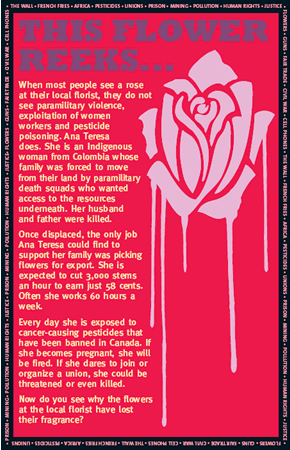The struggle for Dignity behind a Rose: A Reflection for Valentine’s Day
A rose is a rose is a rose – or is it? For many Colombians, particularly women, a rose has become a symbol, not of love, but of exploitation, massive displacement and pesticide poisoning. Around this time two years ago four Colombian partners, leaders of social movements in Colombia, came to Canada and challenged us to look at the story behind the roses we buy from Colombia and the conditions of the workers, mostly women, who grow, cut and trim these flowers for us. They asked us to look at this in the context of the free trade agreement with Colombia. This Valentine’s Day we need to remember their message.
At great risk to their personal safety, these Colombian partners brought first hand testimony of widespread human rights abuses in Colombia, urging the Canadian government not to go ahead with a free trade agreement with Colombia until human rights were guaranteed. They brought evidence of increased extrajudicial killings, death threats against social leaders and trade unionists, and massive displacement. They pleaded with Canadians and the government to listen to the reality experienced by Indigenous and campesino communities, human rights defenders, workers and the women who cut our flowers, rather than the façade presented by the Colombian government that the human rights situation was improving. They called for an independent and impartial human rights impact assessment prior to the implementation of any free trade agreement. Yet, despite widespread opposition in Canada and in Colombia, the Canadian government went ahead with the deal, promising more trade with Colombia, more cut flowers.
Acknowledging human rights concerns and perhaps in an effort to appease the opposition, the Canadian government agreed to annual human rights reports by the governments, hardly the impartial and independent human rights impact assessment that was being called for. The question remains – how will groups that are already marginalized benefit from this deal? How will the voices and testimonies of the women who cut our flowers be heard in these government human rights reports?
Presently, over 60% of the flowers for sale in Canada come from Colombia. With free trade this is sure to increase. But, at what cost?
Typically, a woman who cuts our flowers in Colombia is expected to cut 3,000 stems an hour and earn about 58 cents. Sometimes she works 60 hours a week. Every day, she is exposed to cancer-causing pesticides that have been banned in Canada. If she becomes pregnant, she will be fired. If she dares to join or organize a union, she could be threatened or even killed. What guarantees are there that the trade will not make her situation worse, never mind improve it?
Despite the trade deal with Colombia, our message and that of our partners remains strong: we must not trade human rights for flowers, for gold, for profits, for anything. Human rights are not for sale, nor can they be commodified.
On Valentine’s day, a celebration of love, we are challenged to work for a world where the rose, a symbol of love and a possible gift to our sweetheart, is associated with dignity, well-being and peace, not human rights abuses, violence and environmental harm.
Love comes from a pure heart and a good conscience and a sincere faith.
~Timothy 1:5









